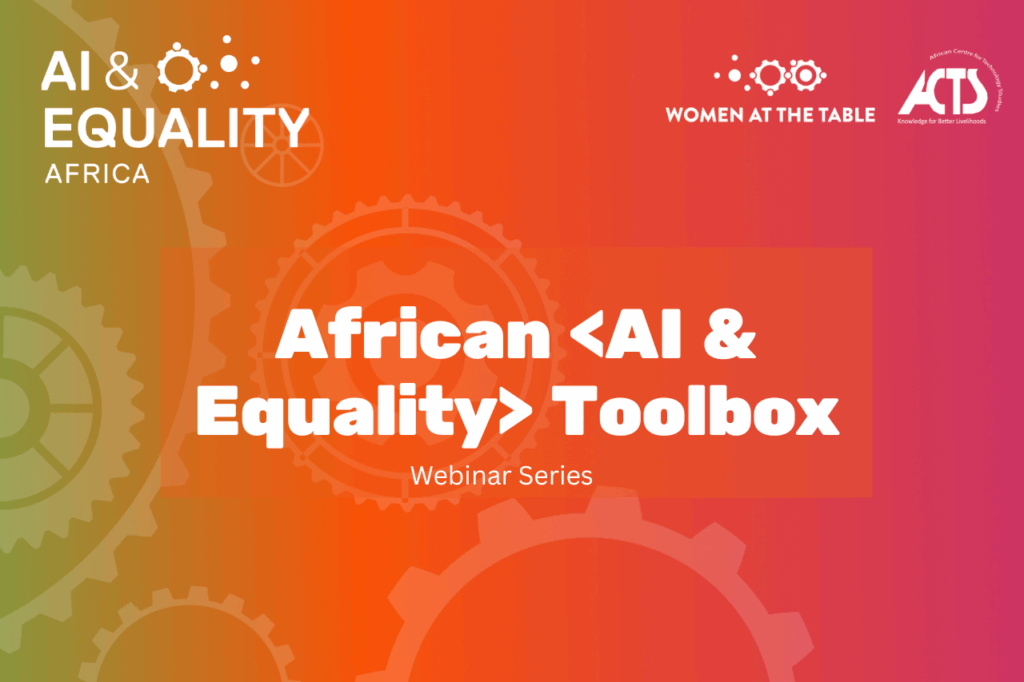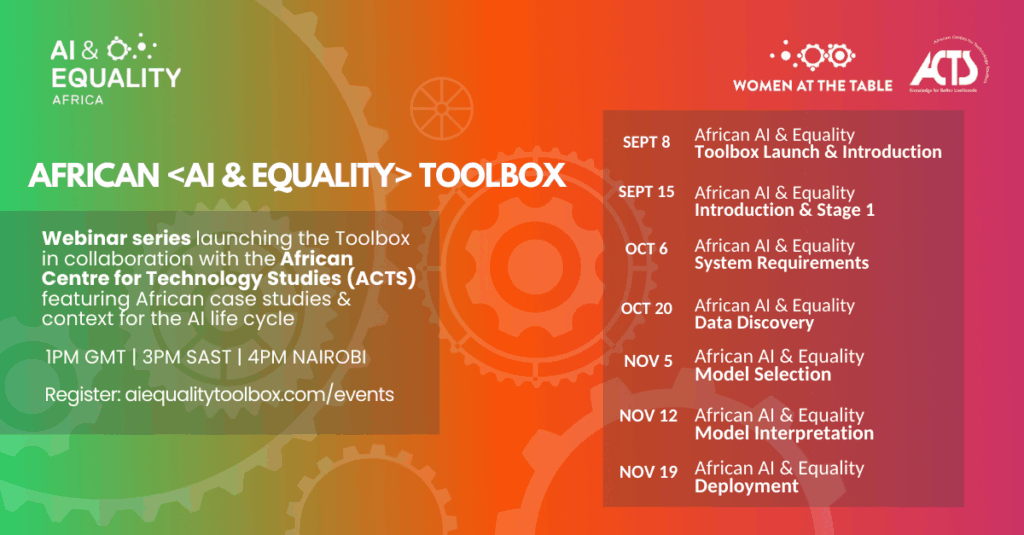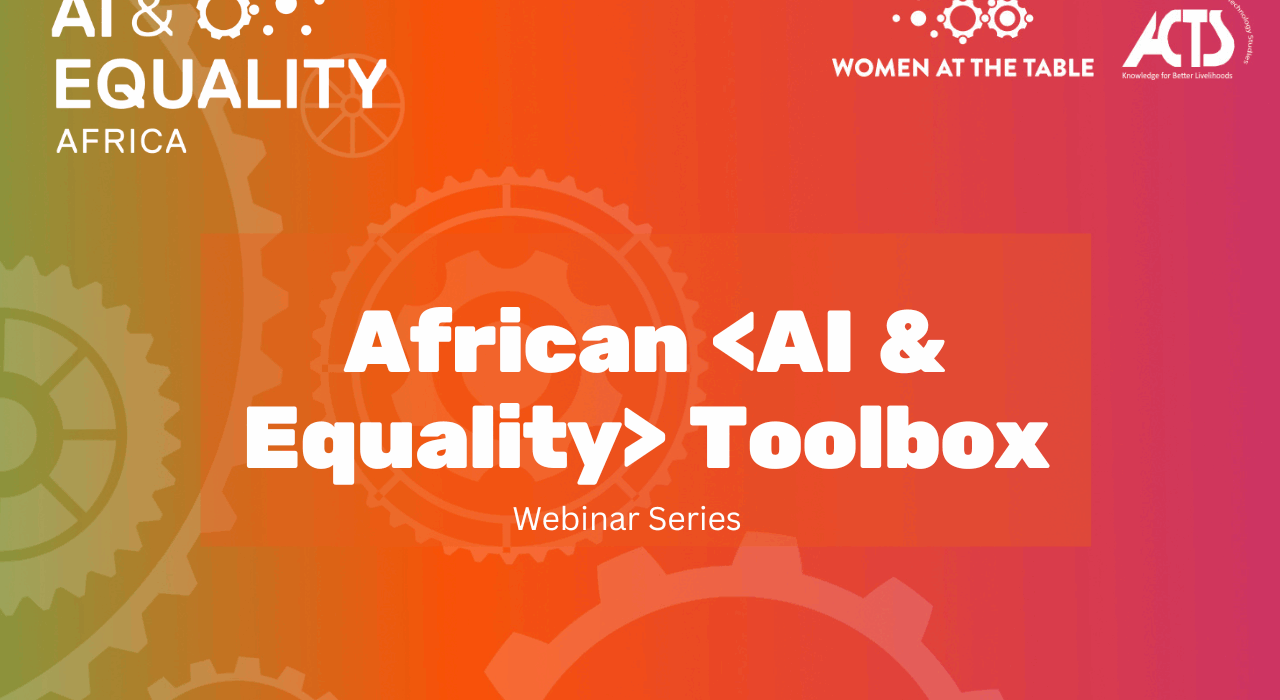Launching the African AI & Equality Toolbox Webinar Series

To mark the launch of the African AI & Equality Toolbox, we are hosting a webinar series bringing together leading voices in AI, human rights, and digital governance. These sessions will explore the Toolbox in depth, showcase case studies, and create space for dialogue across disciplines and geographies.
The webinars will also highlight how feminist civic infrastructure—coalitions, frameworks, and tools that center equity and accountability—can provide a blueprint for democratic digital futures in Africa and beyond.
The African AI & Equality Toolbox is a strategic initiative designed to empower African stakeholders—policymakers, technologists, civil society actors, and communities—to build AI systems that are inclusive, contextually relevant, and grounded in human rights. Developed by Women at the Table and the African Centre for Technology Studies (ACTS), and adapted from the global AI & Equality Human Rights Toolbox in collaboration with the UN Office of the High Commissioner for Human Rights (OHCHR), the African Toolbox provides practical methodologies to ensure AI advances dignity, safety, and justice across the continent.
At its heart is a Human Rights-based AI Lifecycle Framework, developed with the Alan Turing Institute. This framework integrates reflective questions and Human Rights Impact Assessments (HRIAs) into every stage of AI development—from design and data collection to deployment and monitoring. The Toolbox is guided by feminist, decolonial, and JEDI (Justice, Equity, Diversity, and Inclusion) principles, ensuring that communities most affected by technology are not just included but central to shaping it.
Register for the Webinar Series:
1PM GMT | 3PM SAST | 4PM EAT
- September 8 – Toolbox Launch & Introduction
- September 15 – Introduction & Stage 1
- October 6 – System Requirements
- October 20 – Data Discovery
- November 5 – Model Selection
- November 12 – Model Interpretation
- November 19 – Deployment

We invite policymakers, technologists, civil society actors, and all those invested in building inclusive digital futures to join us in this important conversation.As governments, companies, and communities race to build digital public infrastructure across Africa, the stakes could not be higher. Without intervention, AI risks automating inequality at scale. With the African AI & Equality Toolbox, we have a chance to do things differently and the Toolbox is both a practical resource and an open invitation: to build together, to learn together, and to imagine futures where AI advances justice, dignity, and equality.
The Toolbox as a Living Document
Launching in September 2025, the Toolbox is not a static manual but a living document. It invites ongoing contributions from African technologists, policymakers, researchers, and communities. As new challenges and opportunities emerge, the Toolbox will evolve—ensuring it remains relevant, practical, and anchored in local realities.This adaptability is crucial. AI technologies are developing rapidly, and governance frameworks often lag behind. By embedding participatory pathways into the Toolbox, we ensure communities are not only consulted but actively shape the systems that affect their lives.The Toolbox highlights projects where these principles are already in motion:
- Agriculture – AI tools co-designed with women farmers to improve soil health, pest management, and access to markets.
- Health – AI-powered malaria diagnostics in rural Uganda, developed with an emphasis on ethical data use and equitable access.
- Climate – Environmental sensing initiatives that monitor air and noise pollution in African cities and villages, with communities leading in interpretation and deployment.
- Education & Language Inclusion – Natural language processing (NLP) tools for underserved African languages, alongside Kenyan Sign Language translation technologies.
- Digital Safety – AI systems that help detect coordinated online harassment, tackle Technology-Facilitated Gender-Based Violence (TFGBV), and alert platforms when harm occurs.
By focusing on these sectors, the Toolbox demonstrates that AI can be a tool for justice and liberation—not exclusion and harm—when developed with human rights at the core.

